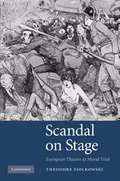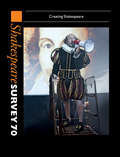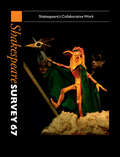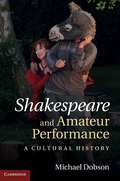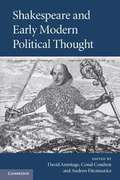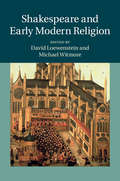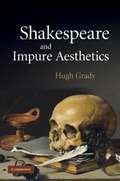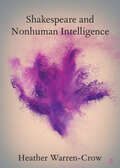- Table View
- List View
Scandal on Stage: European Theater as Moral Trial
by Theodore ZiolkowskiNew plays and operas have often tried to upset the status quo or disturb the assumptions of theatre audiences. Yet, as this study explores, the reactions of the audience or of the authorities are often more extreme than the creators had envisaged, to include outrage, riots, protests or censorship. Scandal on Stage looks at ten famous theater scandals of the past two centuries in Germany and France as symptoms of contemporary social, political, ethical, and aesthetic upheavals. The writers and composers concerned, including Schiller, Stravinsky, Strauss, Brecht and Weil, portrayed new artistic and ideological ideas that came into conflict with the expectations of their audiences. In a comparative perspective, Theodore Ziolkowski shows how theatrical scandals reflect or challenge cultural and ethical assumptions and asks whether theatre can still be, as Schiller wrote, a moral institution: one that successfully makes its audience think differently about social, political and ethical questions
Screening Early Modern Drama
by Pascale AebischerWhile film adaptations of Shakespeare's plays captured the popular imagination at the turn of the last century, independent filmmakers began to adapt the plays of Shakespeare's contemporaries. The roots of their films in European avant-garde cinema and the plays' politically subversive, sexually transgressive and violent subject matter challenge Shakespeare's cultural dominance and the conventions of mainstream cinema. In Screening Early Modern Drama, Pascale Aebischer shows how director Derek Jarman constructed an alternative, dissident, approach to filming literary heritage in his 'queer' Caravaggio and Edward II, providing models for subsequent filmmakers such as Mike Figgis, Peter Greenaway, Alex Cox and Sarah Harding. Aebischer explains how the advent of digital video has led to an explosion in low-budget screen versions of early modern drama. The only comprehensive analysis of early modern drama on screen to date, this groundbreaking study also includes an extensive annotated filmography listing forty-eight surviving adaptations.
Sentimental Opera
by Stefano CastelvecchiSentimental Opera is a study of the relationship between opera and two major phenomena of eighteenth-century European culture - the cult of sensibility and the emergence of bourgeois drama. A thorough examination of social and cultural contexts helps to explain the success of operas such as Paisiello's Nina as well as the extreme emotional reactions of their audiences. Like their counterparts in drama, literature and painting, these works brought to the fore serious contemporary problems including the widespread execution of deserters, the treatment of the insane, and anxieties relative to social and familial roles. They also developed a specifically operatic version of the dominant language of sensibility. This wide-ranging study involves such major cultural figures as Goldoni, Diderot and Mozart, while refining our understanding of the theatrical genre system of their time.
Sexual Politics in the Work of Tennessee Williams
by Michael S. D. HooperMichael S. D. Hooper reverses the recent trend of regarding Tennessee Williams as fundamentally a social writer following the discovery, publication and/or performance of plays from both ends of his career – the 'proletarian' apprentice years of Candles to the Sun and Not About Nightingales and the once overlooked final period of, amongst many other plays, The Red Devil Battery Sign. Hooper contends that recent criticism has exaggerated the political engagement and egalitarian credentials of a writer whose characters and situations revert to a reactionary politics of the individual dominated by the negotiation of sexual power. Directly, or more often indirectly, Williams' writing expresses social disaffection before glamorising the outcast and shelving thoughts of political change. Through detailed analysis of canonical texts the book sheds new light on Williams' work, as well as on the cultural and social life of mid-twentieth-century America.
Shakespeare Beyond Doubt
by Stanley Wells Paul EdmondsonDid Shakespeare write Shakespeare? The authorship question has been much treated in works of fiction, film and television, provoking interest all over the world. Sceptics have proposed many candidates as the author of Shakespeare's works, including Francis Bacon, Christopher Marlowe and Edward De Vere, the seventeenth Earl of Oxford. But why and how did the authorship question arise and what does surviving evidence offer in answer to it? This authoritative, accessible and frequently entertaining book sets the debate in its historical context and provides an account of its main protagonists and their theories. Presenting the authorship of Shakespeare's works in relation to historiography, psychology and literary theory, twenty-three distinguished scholars reposition and develop the discussion. The book explores the issues in the light of biographical, textual and bibliographical evidence to bring fresh perspectives to an intriguing cultural phenomenon.
Shakespeare Beyond English
by Susan Bennett Christie CarsonTackling vital issues of politics, identity and experience in performance, this book asks what Shakespeare's plays mean when extended beyond the English language. From April to June 2012 the Globe to Globe Festival offered the unprecedented opportunity to see all of Shakespeare's plays performed in many different world languages. Thirty-eight productions from around the globe were presented in six weeks as part of the World Shakespeare Festival, which formed a cornerstone of the Cultural Olympics. This book provides the only complete critical record of that event, drawing together an internationally renowned group of scholars of Shakespeare and world theatre with a selection of the UK's most celebrated Shakespearean actors. Featuring a foreword by Artistic Director Dominic Dromgoole and an interview with the Festival Director Tom Bird, this volume highlights the energy and dedication that was necessary to mount this extraordinary cultural experiment.
Shakespeare Performance Studies
by W. B. WorthenTaking a 'performance studies' perspective on Shakespearean theatre, W. B. Worthen argues that the theatrical event represents less an inquiry into the presumed meanings of the text than an effort to frame performance as a vehicle of cultural critique. Using contemporary performances as test cases, Worthen explores the interfaces between the origins of Shakespeare's writing as literature and as theatre, the modes of engagement with Shakespeare's plays for readers and spectators, and the function of changing performance technologies on our knowledge of Shakespeare. This book not only provides the material for performance analysis, but places important contemporary Shakespeare productions in dialogue with three influential areas of critical discourse: texts and authorship, the function of character in cognitive theatre studies, and the representation of theatre and performing in the digital humanities. This book will be vital reading for scholars and advanced students of Shakespeare and of Performance Studies.
Shakespeare Survey 70: Creating Shakespeare (Shakespeare Survey #70)
by Peter HollandThe seventieth volume in the annual series of volumes devoted to Shakespeare study and production. The articles are drawn from the World Shakespeare Congress, held 400 years after Shakespeare's death, in July/August 2016 in Stratford-upon-Avon and London. The theme is 'Creating Shakespeare'.
Shakespeare Survey: Shakespeare Survey
by Peter Holland Emma Peter Smith Emma Smith HollandShakespeare Survey is a yearbook of Shakespeare studies and production. Since 1948 Survey has published the best international scholarship in English and many of its essays have become classics of Shakespeare criticism. Each volume is devoted to a theme, or play, or group of plays; each also contains a section of reviews of the previous year's textual and critical studies and of major British performances. The books are illustrated with a variety of Shakespearean images and production photographs. The current editor of Survey is Peter Holland. The first eighteen volumes were edited by Allardyce Nicoll, numbers 19-33 by Kenneth Muir and numbers 34-52 by Stanley Wells. The virtues of accessible scholarship and a keen interest in performance, from Shakespeare's time to our own, have characterised the journal from the start. For the first time, numbers 1-50 are being reissued in paperback, available separately and as a set.
Shakespeare Survey: Volume 62, Close Encounters with Shakespeare's Text
by Peter HollandShakespeare Survey is a yearbook of Shakespeare studies and production. Since 1948 Survey has published the best international scholarship in English and many of its essays have become classics of Shakespeare criticism. Each volume is devoted to a theme, or play, or group of plays; each also contains a section of reviews of the previous year's textual and critical studies and of major British performances. The books are illustrated with a variety of Shakespearean images and production photographs. The current editor of Survey is Peter Holland. The first eighteen volumes were edited by Allardyce Nicoll, numbers 19-33 by Kenneth Muir and numbers 34-52 by Stanley Wells. The virtues of accessible scholarship and a keen interest in performance, from Shakespeare's time to our own, have characterized the journal from the start. For the first time, numbers 1-50 are being reissued in paperback, available separately and as a set.<P> The theme for volume 62 is 'Close Encounters with Shakespeare's Text'. The complete set of Survey volumes is also available online at http://www.cambridge.org/online/shakespearesurvey. This fully-searchable resource enables users to browse by author, essay and volume, search by play, theme and topic, and save and bookmark their results.
Shakespeare Survey: Volume 64, Shakespeare as Cultural Catalyst
by Peter HollandShakespeare Survey is a yearbook of Shakespeare studies and production. Since 1948 Survey has published the best international scholarship in English and many of its essays have become classics of Shakespeare criticism. Each volume is devoted to a theme, or play, or group of plays; each also contains a section of reviews of the previous year's textual and critical studies and of major British performances. The books are illustrated with a variety of Shakespearean images and production photographs. The current editor of Survey is Peter Holland. The first eighteen volumes were edited by Allardyce Nicoll, numbers 19-33 by Kenneth Muir and numbers 34-52 by Stanley Wells. The virtues of accessible scholarship and a keen interest in performance, from Shakespeare's time to our own, have characterized the journal from the start. For the first time, numbers 1-50 are being reissued in paperback, available separately and as a set.<P> The theme for volume 64 is 'Shakespeare as Cultural Catalyst'. The complete set of Survey volumes is also available online at http://www.cambridge.org/online/shakespearesurvey. This fully-searchable resource enables users to browse by author, essay and volume, search by play, theme and topic, and save and bookmark their results.
Shakespeare Survey: Volume 65, A Midsummer Night's Dream
by Peter HollandShakespeare Survey is a yearbook of Shakespeare studies and production. Since 1948 Survey has published the best international scholarship in English and many of its essays have become classics of Shakespeare criticism. Each volume is devoted to a theme, or play, or group of plays; each also contains a section of reviews of the previous year's textual and critical studies and of major British performances. The books are illustrated with a variety of Shakespearean images and production photographs. The current editor of Survey is Peter Holland. The first eighteen volumes were edited by Allardyce Nicoll, numbers 19-33 by Kenneth Muir and numbers 34-52 by Stanley Wells. The virtues of accessible scholarship and a keen interest in performance, from Shakespeare's time to our own, have characterized the journal from the start. For the first time, numbers 1-50 are being reissued in paperback, available separately and as a set.<P> The theme for Volume 65 is 'A Midsummer Night's Dream'. The complete set of Survey volumes is also available online at http://www.cambridge.org/online/shakespearesurvey. This fully searchable resource enables users to browse by author, essay and volume, search by play, theme and topic and save and bookmark their results.
Shakespeare Survey: Volume 66, Working with Shakespeare
by Peter HollandShakespeare Survey is a yearbook of Shakespeare studies and production. Since 1948 Survey has published the best international scholarship in English and many of its essays have become classics of Shakespeare criticism. Each volume is devoted to a theme, or play, or group of plays; each also contains a section of reviews of the previous year's textual and critical studies and of major British performances. The books are illustrated with a variety of Shakespearean images and production photographs. The current editor of Survey is Peter Holland. The first eighteen volumes were edited by Allardyce Nicoll, numbers 19-33 by Kenneth Muir and numbers 34-52 by Stanley Wells. The virtues of accessible scholarship and a keen interest in performance, from Shakespeare's time to our own, have characterized the journal from the start. For the first time, numbers 1-50 are being reissued in paperback, available separately and as a set. <P> The theme for Volume 66 is 'Working with Shakespeare', and Tiffany Stern's essay has been selected by the Medieval and Renaissance Drama Society for its Barbara Palmer/Martin Stevens award for best new essay in early drama studies, 2014. The complete set of Survey volumes is also available online at http://www.cambridge.org/online/shakespearesurvey. This fully searchable resource enables users to browse by author, essay and volume, search by play, theme and topic and save and bookmark their results.
Shakespeare Survey: Volume 67, Shakespeare's Collaborative Work
by Peter Holland Ton HoenselaarsShakespeare Survey is a yearbook of Shakespeare studies and production. Since 1948 Survey has published the best international scholarship in English and many of its essays have become classics of Shakespeare criticism. Each volume is devoted to a theme, or play, or group of plays; each also contains a section of reviews of the previous year's textual and critical studies and of major British performances. The books are illustrated with a variety of Shakespearean images and production photographs. The current editor of Survey is Peter Holland. The first eighteen volumes were edited by Allardyce Nicoll, numbers 19-33 by Kenneth Muir and numbers 34-52 by Stanley Wells. The virtues of accessible scholarship and a keen interest in performance, from Shakespeare's time to our own, have characterized the journal from the start. For the first time, numbers 1-50 are being reissued in paperback, available separately and as a set.<P> The theme for Volume 67 is 'Shakespeare's Collaborative Work'. The complete set of Survey volumes is also available online at http://www.cambridge.org/online/shakespearesurvey. This fully searchable resource enables users to browse by author, essay and volume, search by play, theme and topic, and save and bookmark their results.
Shakespeare and Amateur Performance
by Michael DobsonFrom the Hamlet acted on a galleon off Africa to the countless outdoor productions of A Midsummer Night's Dream that now defy each English summer, Shakespeare and Amateur Performance explores the unsung achievements of those outside the theatrical profession who have been determined to do Shakespeare themselves. Based on extensive research in previously unexplored archives, this generously illustrated and lively work of theatre history enriches our understanding of how and why Shakespeare's plays have mattered to generations of rude mechanicals and aristocratic dilettantes alike: from the days of the Theatres Royal to those of the Little Theatre Movement, from the pioneering Winter's Tale performed in eighteenth-century Salisbury to the Merchant of Venice performed by Allied prisoners for their Nazi captors, and from the how-to book which transforms Mercutio into Yankee Doodle to the Napoleonic counterspy who used Richard III as a tool of surveillance.
Shakespeare and Early Modern Political Thought
by David Armitage Conal Condren Andrew FitzmauriceThis is the first collaborative volume to place Shakespeare's works within the landscape of early modern political thought. Until recently, literary scholars have not generally treated Shakespeare as a participant in the political thought of his time, unlike his contemporaries Ben Jonson, Edmund Spenser and Philip Sidney. At the same time, historians of political thought have rarely turned their attention to major works of poetry and drama. A distinguished international and interdisciplinary team of contributors examines the full range of Shakespeare's writings in order to challenge conventional interpretations of plays central to the canon, such as Hamlet; open up novel perspectives on works rarely considered to be political, such as the Sonnets; and focus on those that have been largely neglected, such as The Merry Wives of Windsor. The result is a coherent and challenging portrait of Shakespeare's distinctive engagement with the characteristic questions of early modern political thought.
Shakespeare and Early Modern Religion
by David Loewenstein Michael WitmoreWritten by an international team of literary scholars and historians, this collaborative volume illuminates the diversity of early modern religious beliefs and practices in Shakespeare's England, and considers how religious culture is imaginatively reanimated in Shakespeare's plays. Fourteen new essays explore the creative ways Shakespeare engaged with the multifaceted dimensions of Protestantism, Catholicism, non-Christian religions including Judaism and Islam, and secular perspectives, considering plays such as Hamlet, Julius Caesar, King John, King Lear, Macbeth, Measure for Measure, A Midsummer Night's Dream and The Winter's Tale. The collection is of great interest to readers of Shakespeare studies, early modern literature, religious studies, and early modern history.
Shakespeare and Impure Aesthetics
by Hugh GradyShakespeare and Impure Aesthetics explores ideas about art implicit in Shakespeare's plays and defines specific Shakespearean aesthetic practices in his use of desire, death and mourning as resources for art. Hugh Grady draws on a tradition of aesthetic theorists who understand art as always formed in a specific historical moment but as also distanced from its context through its form and Utopian projections. Grady sees A Midsummer Night's Dream, Timon of Athens, Hamlet, and Romeo and Juliet as displaying these qualities, showing aesthetic theory's usefulness for close readings of the plays. The book argues that such social-minded 'impure aesthetics' can revitalize the political impulses of the new historicism while opening up a new aesthetic dimension in the current discussion of Shakespeare.
Shakespeare and Manuscript Drama
by James PurkisHow did Shakespeare write his plays and how were they revised during their passage to the stage? James Purkis answers these questions through a fresh examination of often overlooked evidence provided by manuscripts used in early modern playhouses. Considering collaboration and theatre practice, this book explores manuscript plays by Anthony Munday, Thomas Middleton, and Thomas Heywood to establish new accounts of theatrical revision that challenge formerly dominant ideas in Shakespearean textual studies. The volume also reappraises Shakespeare's supposed part in the Sir Thomas More manuscript by analysing the palaeographic, orthographic, and stylistic arguments for Shakespeare's authorship of three of the document's pages. Offering a new account of manuscript writing that avoids conventional narrative forms, Purkis argues for a Shakespeare fully participant in a manuscript's collaborative process, demanding a reconsideration of his dramatic canon. The book will greatly interest researchers and advanced students of Shakespeare studies, textual history, authorship studies and theatre historians.
Shakespeare and Nonhuman Intelligence (Elements in Shakespeare Performance)
by Heather Warren-CrowThe Infinite Monkey Theorem is an idea frequently encountered in mass market science books, discourse on Intelligent Design, and debates on the merits of writing produced by chatbots. According to the Theorem, an infinite number of typing monkeys will eventually generate the works of Shakespeare. Shakespeare and Nonhuman Intelligence is a metaphysical analysis of the Bard's function in the Theorem in various contexts over the past century. Beginning with early-twentieth century astrophysics and ending with twenty-first century AI, it traces the emergence of Shakespeare as the embattled figure of writing in the age of machine learning, bioinformatics, and other alleged crimes against the human organism. In an argument that pays close attention to computer programs that instantiate the Theorem, including one by biologist Richard Dawkins, and to references in publications on Intelligent Design, it contends that Shakespeare performs as an interface between the human and our Others: animal, god, machine.
Shakespeare and Renaissance Ethics
by John D. Cox Patrick GrayWritten by a distinguished international team of contributors, this volume explores Shakespeare's vivid depictions of moral deliberation and individual choice in light of Renaissance debates about ethics. Examining the intellectual context of Shakespeare's plays, the essays illuminate Shakespeare's engagement with the most pressing moral questions of his time, considering the competing claims of politics, Christian ethics and classical moral philosophy, as well as new perspectives on controversial topics such as conscience, prayer, revenge and suicide. Looking at Shakespeare's responses to emerging schools of thought such as Calvinism and Epicureanism, and assessing comparisons between Shakespeare and his French contemporary Montaigne, the collection addresses questions such as: when does laughter become cruel? How does style reflect moral perspective? Does shame lead to self-awareness? This book is of great interest to scholars and students of Shakespeare studies, Renaissance studies and the history of ethics.
Shakespeare and Textual Studies
by Sonia Massai Kidnie Margaret JaneShakespeare and Textual Studies gathers contributions from the leading specialists in the fields of manuscript and textual studies, book history, editing, and digital humanities to provide a comprehensive reassessment of how manuscript, print and digital practices have shaped the body of works that we now call 'Shakespeare'. This cutting-edge collection identifies the legacies of previous theories and places special emphasis on the most recent developments in the editing of Shakespeare since the 'turn to materialism' in the late twentieth century. Providing a wide-ranging overview of current approaches and debates, the book explores Shakespeare's poems and plays in light of new evidence, engaging scholars, editors, and book historians in conversations about the recovery of early composition and publication, and the ongoing appropriation and transmission of Shakespeare's works through new technologies.
Shakespeare and the Book Trade
by Lukas ErneShakespeare and the Book Trade follows on from Lukas Erne's groundbreaking Shakespeare as Literary Dramatist to examine the publication, constitution, dissemination and reception of Shakespeare's printed plays and poems in his own time and to argue that their popularity in the book trade has been greatly underestimated. Erne uses evidence from Shakespeare's publishers and the printed works to show that in the final years of the sixteenth century and the early part of the seventeenth century, 'Shakespeare' became a name from which money could be made, a book-trade commodity in which publishers had significant investments and an author who was bought, read, excerpted and collected on a surprising scale. Erne argues that Shakespeare, far from indifferent to his popularity in print, was an interested and complicit witness to his rise as a print-published author. Thanks to the book trade, Shakespeare's authorial ambition started to become bibliographic reality during his lifetime.
Shakespeare and the Digital World
by Christie Carson Peter KirwanDue to the unique cultural capital of his works, Shakespeare has long been the test subject for new methods and digital advances in arts scholarship. Shakespeare sits at the forefront of the digital humanities – in archiving, teaching, performance and editing – impacting on scholars, theatres and professional organisations alike. The pace at which new technologies have developed is unprecedented (and the pressure to keep up is only growing). This book offers seventeen new essays that assess the opportunities and pitfalls presented by the twenty-first century for the ongoing exploration of Shakespeare. Through contributions from a broad range of scholars and practitioners, including case studies from those working in the field, the collection engages with the impact of the digital revolution on Shakespeare studies. By assessing and mediating this sometimes controversial digital technology, the book is relevant to those interested in the digital humanities as well as to Shakespeare scholars and enthusiasts.
Shakespeare and the Eighteenth-Century Novel
by Kate RumboldThe eighteenth century has long been acknowledged as a pivotal period in Shakespeare's reception, transforming a playwright requiring 'improvement' into a national poet whose every word was sacred. Scholars have examined the contribution of performances, adaptations, criticism and editing to this process of transformation, but the crucial role of fiction remains overlooked. Shakespeare and the Eighteenth-Century Novel reveals for the first time the prevalence, and the importance, of fictional characters' direct quotations from Shakespeare. Quoting characters ascribe emotional and moral authority to Shakespeare, redeploy his theatricality, and mock banal uses of his words; by shaping in this way what is considered valuable about Shakespeare, the novel accrues new cultural authority of its own. Shakespeare underwrites, and is underwritten by, the eighteenth-century novel, and this book reveals the lasting implications for both of their reputations.
